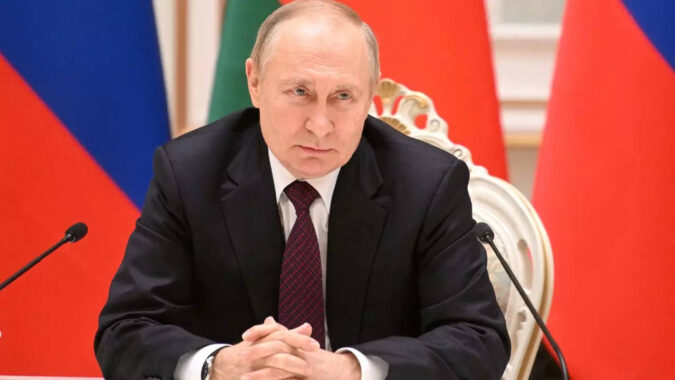KYIV: Nato on Sunday criticised Vladimir Putin for what it called his “dangerous and irresponsible” nuclear rhetoric, a day after the Russian president said he would station tactical nuclear weapons in Belarus.
Putin announced the move on Saturday and likened it to the US stationing its weapons in Europe, while insisting that Russia would not violate its nuclear non-proliferation promises. Although the move was not unexpected, it is one of Russia’s most pronounced nuclear signals since the beginning of its invasion of Ukraine.
While Washington played down concerns about Putin’s announcement, Nato said the Russian president’s non-proliferation pledge and his description of US weapons deployment overseas were way off the mark. “Russia’s reference to Nato’s nuclear sharing is totally misleading,” a Nato spokesperson said on Sunday.
The EU’s foreign policy chief Josep Borrell said on Sunday that Brussels was ready to impose new sanctions on Belarus if Minsk were to host Russian nuclear weapons. “Belarus hosting Russian nuclear weapons would mean an irresponsible escalation and threat to European security…,” he tweeted.
A top security adviser to Ukrainian President Volodymyr Zelenskyy, Oleksiy Danilov, said Russia’s plan would also destabilise Belarus, which he said had been taken “hostage” by Moscow.
Experts said Russia’s move was significant since it had until now been proud that unlike the US, it did not deploy nuclear weapons outside borders. It may be the first time since the mid-1990s that it has done so.
Another senior Zelenskyy adviser scoffed at Putin’s plan, saying the Russian leader is “too predictable”. “Making a statement about tactical nuclear weapons in Belarus, he admits that he is afraid of losing & all he can do is scare with tactics,” Mykhailo Podolyak wrote on Twitter. Washington appeared to see no change in the potential for Moscow to use nuclear weapons in the war in Ukraine, and it and Nato said the news would not affect their own nuclear position.
Putin said Belarusian President Alexander Lukashenko had long requested the deployment. There was no immediate reaction from Lukashenko. While the Belarusian army has not formally fought in Ukraine, Minsk and Moscow have close military ties.
Putin announced the move on Saturday and likened it to the US stationing its weapons in Europe, while insisting that Russia would not violate its nuclear non-proliferation promises. Although the move was not unexpected, it is one of Russia’s most pronounced nuclear signals since the beginning of its invasion of Ukraine.
While Washington played down concerns about Putin’s announcement, Nato said the Russian president’s non-proliferation pledge and his description of US weapons deployment overseas were way off the mark. “Russia’s reference to Nato’s nuclear sharing is totally misleading,” a Nato spokesperson said on Sunday.
The EU’s foreign policy chief Josep Borrell said on Sunday that Brussels was ready to impose new sanctions on Belarus if Minsk were to host Russian nuclear weapons. “Belarus hosting Russian nuclear weapons would mean an irresponsible escalation and threat to European security…,” he tweeted.
A top security adviser to Ukrainian President Volodymyr Zelenskyy, Oleksiy Danilov, said Russia’s plan would also destabilise Belarus, which he said had been taken “hostage” by Moscow.
Experts said Russia’s move was significant since it had until now been proud that unlike the US, it did not deploy nuclear weapons outside borders. It may be the first time since the mid-1990s that it has done so.
Another senior Zelenskyy adviser scoffed at Putin’s plan, saying the Russian leader is “too predictable”. “Making a statement about tactical nuclear weapons in Belarus, he admits that he is afraid of losing & all he can do is scare with tactics,” Mykhailo Podolyak wrote on Twitter. Washington appeared to see no change in the potential for Moscow to use nuclear weapons in the war in Ukraine, and it and Nato said the news would not affect their own nuclear position.
Putin said Belarusian President Alexander Lukashenko had long requested the deployment. There was no immediate reaction from Lukashenko. While the Belarusian army has not formally fought in Ukraine, Minsk and Moscow have close military ties.
